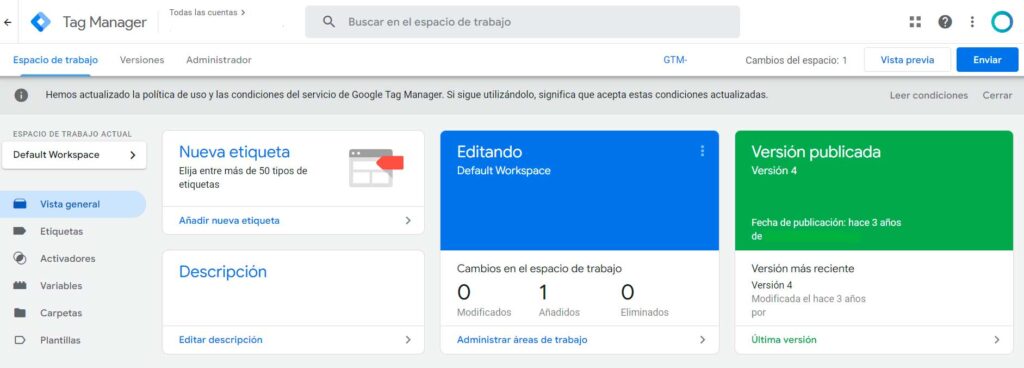Web analytics is a fundamental discipline in online marketing. It allows you to measure a website’s performance and effectiveness, analyze user behavior, and optimize digital strategies. Tools like Google Analytics make this process easier. Training in web analytics is key to success in the digital environment. Case studies of successful companies demonstrate the positive impact of this discipline on online marketing. Web analytics is an essential tool for improving user experience and increasing online conversions.
What is Web Analytics?
Web analytics is a key discipline in online marketing that provides valuable insights into website performance and user behavior. By collecting and analyzing data, it allows you to measure the effectiveness of implemented strategies and obtain key insights for decision-making.
Definition and Key Concepts
It focuses on obtaining, analyzing, and understanding data related to user activity on a website. It enables evaluation of the effectiveness of actions taken and optimization of the user experience.
Importance of Web Analytics
It is essential for success in online marketing as it provides the necessary information to evaluate the impact of digital strategies and make adjustments to improve website performance.
Advantages in Online Marketing
- Detailed knowledge of the users visiting the site.
- Identification of trends and opportunities for improvement.
- Optimization of the user experience.
- Improvement of digital marketing strategy.
- Increase in conversions through data-driven decision making.
Web Analytics Tools and Techniques
Having the right tools and mastering web analytics techniques is critical for online success. Below are the main available tools, the data analysis process, and a detailed look at Google Analytics.
Main Tools Available
- Google Analytics: Google’s free platform to analyze web traffic and user behavior in real time.
- Adobe Analytics: Advanced solution providing detailed and customized website performance analysis.
- Ahrefs: Powerful tool for backlink analysis and SEO, offering keyword tracking, competitor research, and site audits.
- Sistrix: Provides search engine visibility and SEO analysis with a focus on indexability, on-page optimization, and competition evaluation.
- SEMrush: All-in-one SEO tool for keyword tracking, website auditing, and competitor comparison.
Data Analysis Process
The data analysis process in web analytics involves collecting information, processing it, and extracting relevant conclusions for decision-making. This process includes identifying patterns, trends, and opportunities based on objective data.
Google Analytics: A Detailed Overview
Google Analytics is the most widely used web analytics tool due to its versatility and ease of use. It allows you to measure website traffic, marketing campaign performance, and user interaction with the site. With detailed and customizable reports, Google Analytics provides valuable insights to optimize digital strategies and enhance the user experience.

Strategies to Analyze and Improve Website SEO
Strategies to optimize a website’s SEO are essential to increase its visibility in search engines and attract quality organic traffic. Below are the main techniques and tools to achieve this effectively.
SEO Data Analysis
- Perform a comprehensive analysis of existing SEO data on the website, such as organic traffic, top keywords, and page performance in search engines.
- Identify opportunities and weak points that may be affecting site ranking.
- Use web analytics tools to collect and analyze relevant data for objective decision-making.
Keyword Optimization
- Conduct keyword research to identify the most relevant and high-volume search terms in the market niche.
- Select strategic keywords and naturally distribute them throughout the site content, including titles, meta descriptions, headings, and visible text.
- Create high-quality, relevant content optimized for selected keywords, ensuring appropriate density and coherent semantic structure.
Using Google Tag Manager for SEO

- Implement Google Tag Manager to efficiently manage tags and event tracking, facilitating integrated measurement and data analysis.
- Configure custom tags to track detailed user interactions, such as link clicks, file downloads, or video plays.
- Use event tracking to evaluate conversion performance, analyze user behavior, and adjust SEO strategy based on obtained data.
Web Analytics Courses and Training
Training in web analytics is essential to fully understand the functioning and interpretation of data obtained through various tools. Understanding KPIs, user behavior, and optimization of digital strategies is critical to maximize this discipline.
Best Courses and Resources
- Google Analytics Course: Essential for mastering the tool and making the most of web analytics.
- Web Analytics Certification: Obtaining a recognized certification can enhance credibility and open professional opportunities.
- Online Resources: Platforms like Coursera, Udemy, and LinkedIn Learning offer a variety of courses and tutorials on web analytics for all levels.
Benefits of Training
Training in web analytics provides numerous benefits, both professionally and personally. It allows for better decision-making, improves digital strategy effectiveness, and helps stand out in a competitive market. Staying updated on trends and tools is key to online marketing success.
Lessons Learned from Successful Projects
- Importance of setting clear, measurable objectives at the start of any web analytics project.
- Need for a trained team specialized in data analysis to interpret information effectively.
- Persistence in implementing changes based on analytics results, with flexibility to adjust strategies according to market trends.
Practical Applications in Digital Marketing
Improving User Experience
Web analytics provides tools to analyze user behavior, identify areas for improvement, and adapt website design and structure to offer a more satisfying and personalized experience.
Optimizing Online Marketing Strategies
It delivers detailed information about the performance of online marketing strategies, allowing real-time adjustments. Analytics identify campaigns or actions generating more traffic, conversions, or engagement, optimizing strategy effectiveness.
Data-Driven Decision Making
Web analytics provides concrete, objective data on website performance and digital marketing actions, enabling informed decision-making based on accurate information.
The Future of Web Analytics
Emerging Trends
Web analytics is moving towards greater personalization in data collection and analysis, allowing deeper understanding of user behavior.
The integration of AI and machine learning promises to revolutionize how data is collected and used.
New Tools and Technologies in Development
- Multi-platform web analytics tools with real-time tracking capabilities.
- Blockchain-based analytics tools for increased data security and transparency.
Future Perspectives in Online Marketing
Web analytics will remain fundamental in online marketing, evolving towards greater integration with SEO, SEM, and content marketing. Automation and personalization based on data will drive the growth and effectiveness of digital campaigns in the future.



